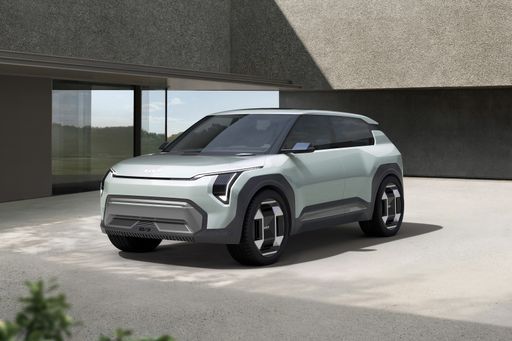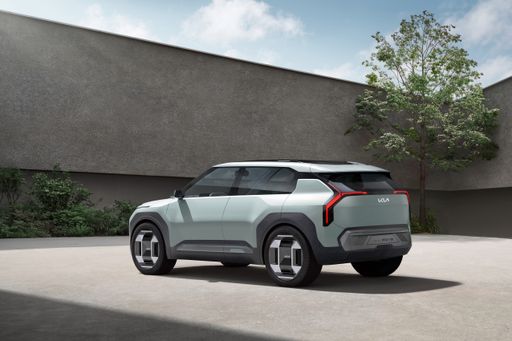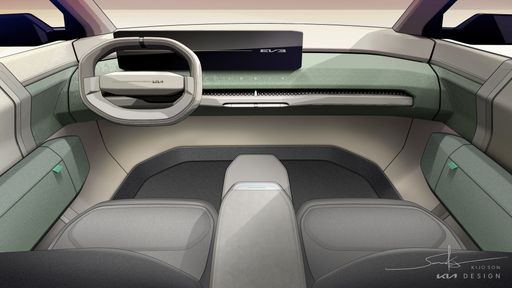Kia EV3 vs VW Tiguan - Differences and prices compared
Compare performance (204 HP vs 272 HP), boot space and price (30800 £ vs 32800 £) at a glance. Find out which car is the better choice for you – Kia EV3 or VW Tiguan?
Costs and Efficiency:
Price and efficiency are often the first things buyers look at. Here it becomes clear which model has the long-term edge – whether at the pump, the plug, or in purchase price.
Kia EV3 has a hardly perceptible advantage in terms of price – it starts at 30800 £, while the VW Tiguan costs 32800 £. That’s a price difference of around 1937 £.
As for range, the Kia EV3 performs convincingly better – achieving up to 605 km, about 479 km more than the VW Tiguan.
Engine and Performance:
Power, torque and acceleration say a lot about how a car feels on the road. This is where you see which model delivers more driving dynamics.
When it comes to engine power, the VW Tiguan has a noticeable edge – offering 272 HP compared to 204 HP. That’s roughly 68 HP more horsepower.
In acceleration from 0 to 100 km/h, the VW Tiguan is evident quicker – completing the sprint in 5.90 s, while the Kia EV3 takes 7.50 s. That’s about 1.60 s faster.
In terms of top speed, the VW Tiguan performs distinct better – reaching 242 km/h, while the Kia EV3 tops out at 170 km/h. The difference is around 72 km/h.
There’s also a difference in torque: VW Tiguan pulls noticeable stronger with 400 Nm compared to 283 Nm. That’s about 117 Nm difference.
Space and Everyday Use:
Cabin size, boot volume and payload all play a role in everyday practicality. Here, comfort and flexibility make the difference.
Both vehicles offer seating for 5 people.
In curb weight, VW Tiguan is to a small extent lighter – 1599 kg compared to 1800 kg. The difference is around 201 kg.
In terms of boot space, the VW Tiguan offers evident more room – 652 L compared to 460 L. That’s a difference of about 192 L.
In maximum load capacity, the VW Tiguan performs noticeable better – up to 1650 L, which is about 399 L more than the Kia EV3.
When it comes to payload, VW Tiguan slightly takes the win – 533 kg compared to 470 kg. That’s a difference of about 63 kg.
Who comes out on top?
Overall, the Kia EV3 shows itself to be performs better in key areas and secures the title of DriveDuel Champion.
It convinces with the more balanced overall package and proves to be the more versatile choice for everyday use.

Kia EV3
Costs and Consumption
View detailed analysis
Engine and Performance
View detailed analysis
Dimensions and Body
View detailed analysis
Kia EV3
The Kia EV3 arrives as a cheeky, practical electric compact that manages to feel both premium and playful, delivering crisp handling and a roomy cabin that's perfect for urban life. With smart tech, friendly styling and sensible pricing, the EV3 is the kind of car that makes switching to electric feel like a no-brainer without asking you to give anything important up.
details


VW Tiguan
The VW Tiguan blends sensible family practicality with a dash of German polish, delivering a calm, reassuring ride and a cabin that never feels like an afterthought. For buyers who want an SUV that’s easy to live with yet still nicely dressed, the Tiguan is the grown‑up choice that keeps a cheeky wink in reserve.
details






|

|
|
|
|
Costs and Consumption |
|
|---|---|
|
Price
30800 - 41700 £
|
Price
32800 - 51900 £
|
|
Consumption L/100km
-
|
Consumption L/100km
1.4 - 8.4 L
|
|
Consumption kWh/100km
14.9 - 16.2 kWh
|
Consumption kWh/100km
-
|
|
Electric Range
436 - 605 km
|
Electric Range
118 - 126 km
|
|
Battery Capacity
58.3 - 81.4 kWh
|
Battery Capacity
19.70 kWh
|
|
co2
0 g/km
|
co2
32 - 190 g/km
|
|
Fuel tank capacity
-
|
Fuel tank capacity
45 - 58 L
|
Dimensions and Body |
|
|---|---|
|
Body Type
SUV
|
Body Type
SUV
|
|
Seats
5
|
Seats
5
|
|
Doors
5
|
Doors
5
|
|
Curb weight
1800 - 1885 kg
|
Curb weight
1599 - 1890 kg
|
|
Trunk capacity
460 L
|
Trunk capacity
490 - 652 L
|
|
Length
4300 - 4310 mm
|
Length
4539 mm
|
|
Width
1850 mm
|
Width
1842 - 1859 mm
|
|
Height
1560 - 1570 mm
|
Height
1656 - 1658 mm
|
|
Max trunk capacity
1251 L
|
Max trunk capacity
1486 - 1650 L
|
|
Payload
470 kg
|
Payload
460 - 533 kg
|
Engine and Performance |
|
|---|---|
|
Engine Type
Electric
|
Engine Type
Petrol, Petrol MHEV, Diesel, Plugin Hybrid
|
|
Transmission
Automatic
|
Transmission
Automatic
|
|
Transmission Detail
Reduction Gearbox
|
Transmission Detail
Dual-Clutch Automatic
|
|
Drive Type
Front-Wheel Drive
|
Drive Type
All-Wheel Drive, Front-Wheel Drive
|
|
Power HP
204 HP
|
Power HP
130 - 272 HP
|
|
Acceleration 0-100km/h
7.5 - 7.9 s
|
Acceleration 0-100km/h
5.9 - 10.6 s
|
|
Max Speed
170 km/h
|
Max Speed
198 - 242 km/h
|
|
Torque
283 Nm
|
Torque
220 - 400 Nm
|
|
Number of Cylinders
-
|
Number of Cylinders
4
|
|
Power kW
150 kW
|
Power kW
96 - 200 kW
|
|
Engine capacity
-
|
Engine capacity
1498 - 1984 cm3
|
General |
|
|---|---|
|
Model Year
2024
|
Model Year
2024 - 2025
|
|
CO2 Efficiency Class
A
|
CO2 Efficiency Class
G, D, E, F, B
|
|
Brand
Kia
|
Brand
VW
|
What drive types are available for the Kia EV3?
The Kia EV3 is offered with Front-Wheel Drive.
The prices and data displayed are estimates based on German list prices and may vary by country. This information is not legally binding.
